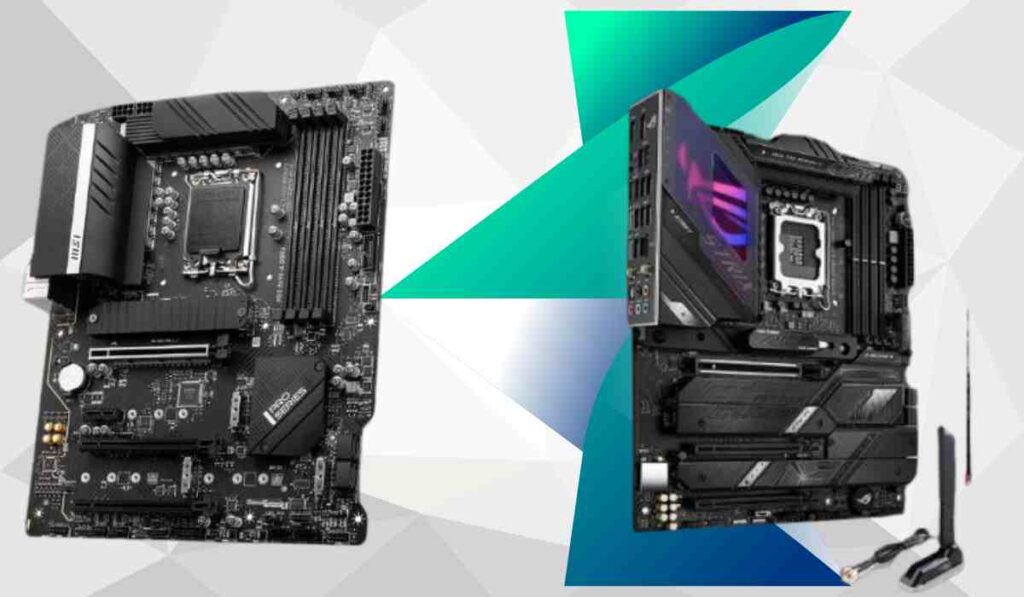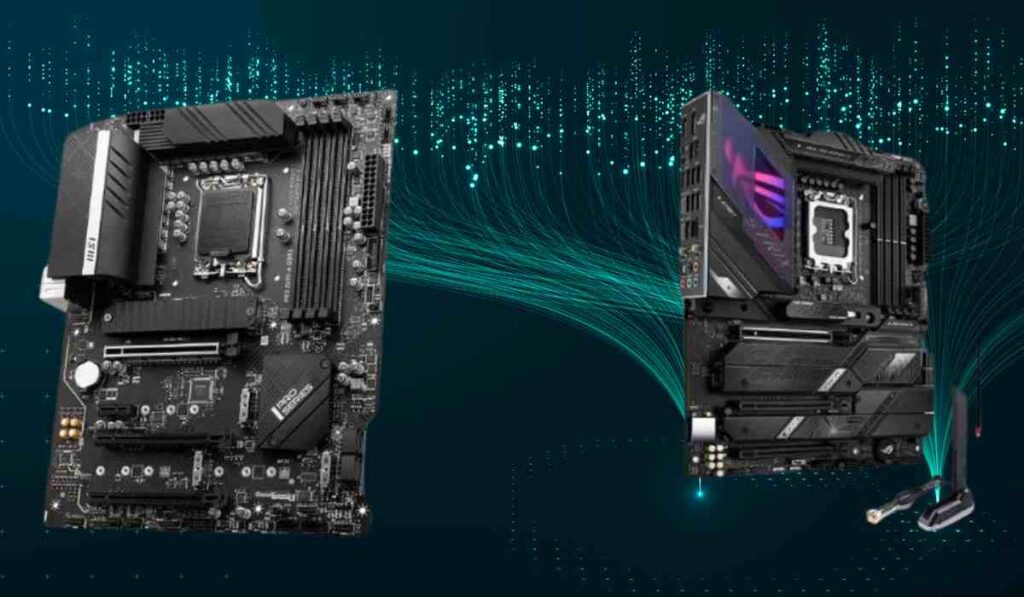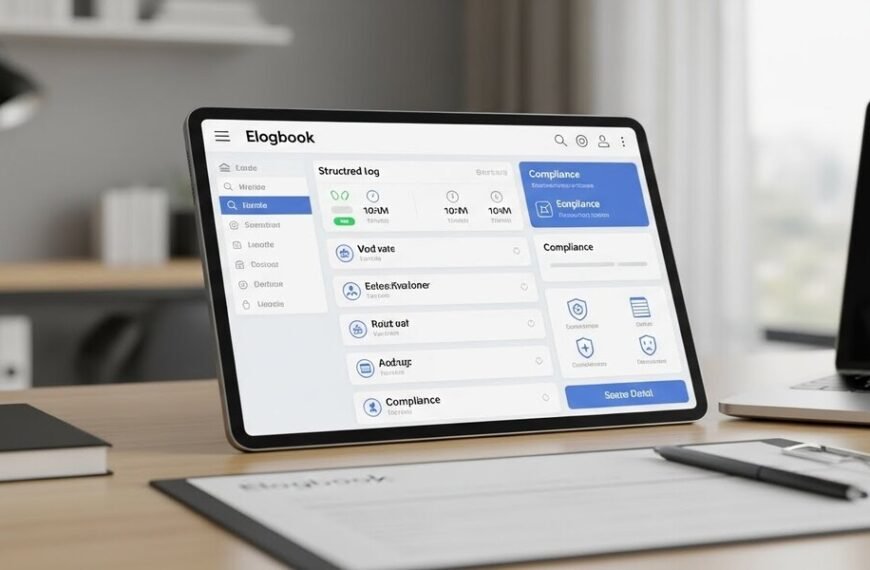Introduction:
Selecting the right motherboard is crucial when building a gaming PC or workstation. With Intel’s latest 13th Gen Core processors, the choice between the Z690 and Z790 chipsets has become more important than ever.
In this comprehensive guide, we’ll delve deep into the comparison of Z690 vs Z790, exploring their features, performance, and suitability for various builds.
Understanding Chipsets:
Before diving into the specifics of Z690 and Z790, let’s establish a fundamental understanding of chipsets. A chipset serves as the backbone of a motherboard, facilitating communication between the CPU, RAM, storage, GPU, and other peripherals.
Intel designs chipsets like Z690 and Z790 to complement their processors, ensuring optimal performance and compatibility.
Z790: Intel’s Latest Offering
The Z790 chipset is Intel’s newest addition, tailored to support both 12th and 13th Gen Intel Core processors. It shares the same LGA 1700 socket as its predecessor, the Z690, but introduces several enhancements and additional features.
These improvements aim to provide users with better performance, connectivity options, and future-proofing for upcoming hardware advancements.
Z690 vs Z790: Feature Comparison:

Let’s break down the key features of both chipsets to understand their similarities and differences comprehensively.
Intel Socket Compatibility
Both Z690 and Z790 motherboards utilize the LGA 1700 socket, ensuring seamless compatibility with the latest Intel processors available in the market.
Support for 12th Gen Processors
Both chipsets come with native support for 12th Gen Intel Core processors, enabling users to harness the power of these high-performance CPUs without any additional requirements.
Compatibility with 13th Gen Processors
While both Z690 and Z790 can accommodate 13th Gen Intel Core processors, it’s essential to note that a BIOS update might be necessary for full compatibility with the latest generation CPUs.
Overclocking Capabilities
Enthusiasts will rejoice knowing that both Z690 and Z790 motherboards support overclocking, allowing users to fine-tune their CPU performance for enhanced speed and efficiency.
Maximum RAM Speed and Capacity
Z690 supports RAM speeds of up to 6400MHz, catering to users who demand high-speed memory for intensive tasks. However, Z790 raises the bar further by supporting RAM speeds of up to 6800MHz, providing even greater performance potential.
Both chipsets can accommodate a maximum RAM capacity of 128GB, ideal for multitasking and content creation workflows that require extensive memory resources.
PCIe Lanes and Configurations
With a total of 28 PCIe lanes, both Z690 and Z790 offer ample connectivity options for expansion cards and storage devices. Various PCIe configurations are available, ensuring compatibility with a wide range of peripherals and components to suit different build requirements.
USB Connectivity
Z790 gains a slight advantage over Z690 with additional USB 3.2 Gen 2×2 ports, enhancing connectivity options for users who rely on high-speed data transfer and peripheral connections. This additional connectivity can be beneficial for users with demanding workflow needs or extensive external device requirements.
Performance Comparison
Extensive testing and benchmarking have shown that there is negligible performance difference between Z690 and Z790 motherboards. Both chipsets deliver robust performance, reliability, and stability, ensuring smooth operation under various workloads and gaming scenarios.
However, it’s essential to consider that individual processor models may exhibit slight performance variations, but these differences are not attributed to the motherboard chipset.
After extensive testing and benchmarking, it’s evident that there’s little to no discernible difference in performance between Z690 and Z790 motherboards. Both chipsets deliver robust performance, reliability, and stability, ensuring smooth operation under heavy workloads and demanding gaming scenarios.
However, it’s essential to note that individual processor models may exhibit slight performance variations, but these differences are not attributed to the motherboard chipset.
Factors Influencing Your Decision:

When deciding between Z690 and Z790 for your next PC build, several factors should be taken into consideration:
Budget Consideration:
Z690 motherboards are known for offering excellent value for money, making them a preferred choice for builders on a budget.
Conversely, Z790 boards may come with a premium price tag due to their newer features and enhancements, appealing more to users willing to invest in the latest technology.
Future-Proofing Your Build:
Opting for a Z790 motherboard can be advantageous if you prioritize future-proofing your build.
With support for higher RAM speeds and additional connectivity options, Z790 provides better readiness for emerging technologies and hardware upgrades.
Meeting Specific Requirements:
Consider your specific needs and preferences before deciding between Z690 and Z790.
If features like Thunderbolt 4 support or compatibility with DDR5-6800 RAM are essential for your build, a Z790 motherboard would be the more suitable choice.
Conclusion
In conclusion, both Z690 and Z790 offer compelling features, performance, and reliability, making them excellent choices for PC enthusiasts and professionals alike.
While Z790 introduces some enhancements over its predecessor, the decision ultimately boils down to your budget, future upgrade plans, and specific requirements.
Whether you opt for the tried-and-tested Z690 or embrace the latest innovations with Z790, rest assured that both chipsets provide a solid foundation for your next PC build.
FAQs
Can I use DDR4 RAM on a Z790 motherboard?
Answer: No, Z790 motherboards are designed to support DDR5 RAM exclusively. Attempting to use DDR4 RAM on a Z790 motherboard may result in compatibility issues and system instability.
Are Z690 and Z790 motherboards backward compatible with older Intel processors?
Answer: No, both Z690 and Z790 motherboards are only compatible with Intel’s 12th and 13th Gen Core processors. Attempting to use older Intel processors may result in compatibility issues, as these chipsets are optimized for the latest CPU architectures.
What is the maximum number of GPUs I can install on a Z790 motherboard for multi-GPU setups?
Answer: Most Z790 motherboards support configurations for up to two GPUs in multi-GPU setups. However, it’s essential to check the specific motherboard’s specifications and PCIe slot availability for compatibility with your desired GPU configuration.
Can I use a Z690 motherboard with a 13th Gen Intel Core processor without updating the BIOS?
Answer: While some Z690 motherboards may offer limited compatibility with 13th Gen Intel Core processors out of the box, it’s recommended to update the BIOS to ensure full compatibility and optimal performance with the latest CPU architecture.
Do Z690 and Z790 motherboards support Intel Optane Memory?
Answer: Yes, both Z690 and Z790 motherboards support Intel Optane Memory technology, allowing users to accelerate system performance and responsiveness by combining traditional storage drives with Intel Optane Memory modules.
Can I use a Z690 or Z790 motherboard for professional workstation tasks such as 3D rendering and video editing?
Answer: Yes, both Z690 and Z790 motherboards are suitable for professional workstation tasks, thanks to their robust feature sets, high-speed connectivity options, and support for powerful Intel Core processors.
However, users may consider additional factors such as RAM capacity, GPU compatibility, and storage options based on their specific workload requirements.
Are Z690 and Z790 motherboards compatible with Linux operating systems?
Answer: Yes, Z690 and Z790 motherboards are generally compatible with various Linux distributions. However, users may need to ensure that necessary drivers are available for specific components such as networking adapters, sound cards, and GPU drivers for optimal compatibility and performance under Linux environments.
Can I use Z690 or Z790 motherboards for extreme overclocking?
Answer: Yes, both Z690 and Z790 motherboards support overclocking capabilities, allowing enthusiasts to push their CPU and memory frequencies beyond stock settings for increased performance.
However, users should ensure proper cooling solutions and adhere to recommended overclocking practices to prevent damage to components and maintain system stability.
Also Read:
Demystifying Front Panel Connectors: A Comprehensive Guide
Demystifying AAFP Motherboards: Your Ultimate Guide to Seamless Audio Integration
Unveiling the Ultimate Z690 Motherboard Tier List: Your Guide to the Best Picks






